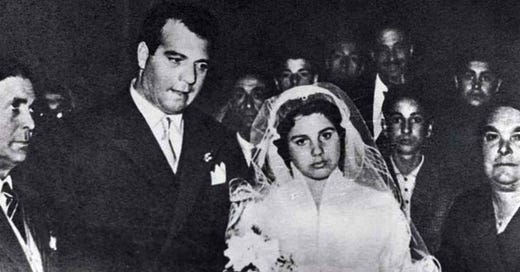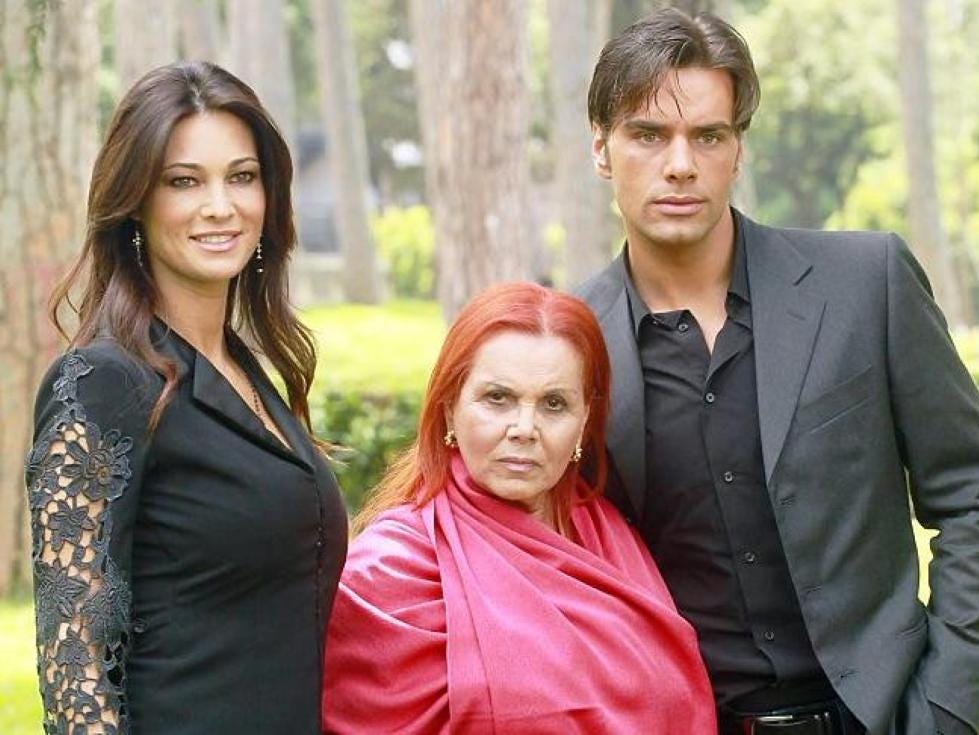The Camorra, the mafia of Naples, has always pursued a path of its own. From its ranks have emerged some extraordinary women.
One such was Assunta Maresca (1935-2021), a former beauty queen, who was known as Pupetta, ‘Dolly’. Her entire family were involved in organised crime, as was her husband. At the age of twenty she was expecting her first child when her husband was murdered, just three months after the wedding. Pupetta took action, gunning down his murderer (who just happened to be the best man at the wedding) in the street. She was arrested for murder, and her trial turned into a media circus. In court she expressed no remorse for the crime, but said ‘I would do it again!’ This remark was cheered to the rafters. She was sent down for eighteen years, later reduced to thirteen years on appeal. But she was already a heroine. True, she had shot a man, six times times no less, in broad daylight, but he had murdered her husband, and the police were never going to take action, so what was a poor widow to do to get justice?
Pupetta was pardoned in 1965, which was very generous of the Italian state, and spent the rest of her life involved in criminal activities. Her family life was marked by tragedy. Her son, Pasquale, was born in prison, and was abducted and murdered at the age of 18, in 1974. His body was never recovered, and it was rumoured that he was disposed of at sea, with a weight around his neck. The chief suspect for his murder was Pupetta’s then lover, a camorrista called Umberto Ammaturo, by whom she had had twins. It seems that Pasquale did not like his mother’s lover and the feeling was mutual. Ammaturo was arrested for the murder, but there was insufficient evidence to prosecute. Pupetta continued to associate with Ammaturo for another eight years after Pasquale’s death. She was adamant that Ammaturo was not responsible, but did she have her doubts in private? One does wonder. She later broke up with Ammaturo because he found someone younger. Her comment to the newspapers was rather dignified. ‘For me Umberto no longer exists; there remains alone the father of my children, who love him and respect him as is their duty.’
Pupetta clearly enjoyed publicity, and she lived her life in the full glare of newspaper and even film coverage. She acted in a film, and sang. She could actually sing quite well, as this video shows.
She also posed for photographs. All this is most unmafia-like, but very Neapolitan. Naples is loud, brash, and full of stunningly beautiful people, a place where if you have got it, you flaunt it. She certainly did. This is in strong contrast to Salvatore Riina of whom there were no recent photographs when he was on the run for three decades, and who lived his life in the shadows.
Towards the end of her life she collaborated with a television miniseries entitled Pupetta: Il coraggio e la passione, a drama based on her life produced by Mediaset, Silvio Berlusconi’s television company. She clearly revelled in the attention. But was this necessarily the best way to go about being a crime boss?
One is left with two reflections. All criminals are egotists, we can take that as read, but every criminal needs to control the ego, and control the passions. Shooting her husband’s murderer dead in broad daylight was certainly theatrical, but also a calculated bid for fame and renown that worked. As for the other activities, one really wonders how they helped her criminal career at all.
The second thing is this: Pupetta the former beauty queen shot her husband, and ran a mob operation. Why were people so interested? Why was she famous as ‘Lady Camorra’, as the Italians termed her? In fairness, many of the Italian authorities, including some in Naples, were horrified by this. “We are seeing on social media a glorification of this woman who is a symbol of the Camorra in our neighbourhood,” Francesco Emilio Borrelli, a regional councillor for the Europa Verde party, said in a letter to the Naples police, as The Guardian reported after her death. “The mythologising of bosses is to be avoided at all costs.” The local authorities banned a public funeral. That, incidentally, would have saved the Church much embarrassment, as well as preventing a demonstration of pro-Camorra fervour. But the question remains: why do we love gangsters so much? It is a question I ask myself, but I do not have the answer, at least, not yet.






